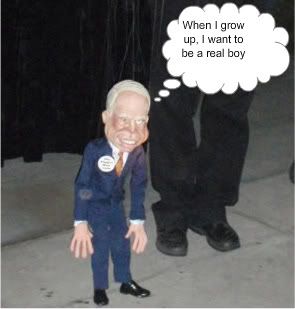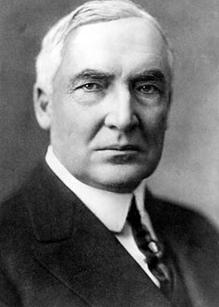Broke: The Plan to Restore Our Trust, Truth and Treasure
More Cities on Brink of Bankruptcy
CNBC Reporter
 |
Jeremy Woodhouse | The Image Bank | Getty Images |

Kate Kelly
CNBC Reporter
 |
Jeremy Woodhouse | The Image Bank | Getty Images |


 DSSA Bill a Big win for Big Pharma?
DSSA Bill a Big win for Big Pharma?Of course, McCain didn't introduce a bill to do anything about the more than 100,000 people a year that die from drug interactions from the Pharmaceutical industry.He said it was about "truth in labeling," saying it only makes sense because Americans can get ingredients off the side of a cereal box or a container of yogurt.
Of course, today we know that supplements like CoQ10 have can vastly improve human health, and there are studies that show that CoQ10 can be more beneficial than some of the expressive medications that have been approved by the FDA. In a way, CoQ10 is costing big Pharma Billions in additional profits!
 I personally believe that CEO's of PUBLICLY Traded companies, should never be paid more than 10X the Median income in the State they do business in because of that. It's a publicly traded company, not a completely private firm, doing business with completely private money. However, I DO feel that there definitely should be Stock Options given to attempt to match the pay at private companies.
I personally believe that CEO's of PUBLICLY Traded companies, should never be paid more than 10X the Median income in the State they do business in because of that. It's a publicly traded company, not a completely private firm, doing business with completely private money. However, I DO feel that there definitely should be Stock Options given to attempt to match the pay at private companies.The End.
What? You don't get it? Think of it this way. You have Auto Insurance. Do they pay for Oil changes? No? Why Not, it's Auto Care isn't it? You're right, it's not, it's Auto Insurance. Auto Care probably wouldn't work, because then EVERYONE would start taking their cars to get oil changes 4X a year, just as the Dealers all say we should, then what would happen. There would be an Oil Change Shortage wouldn't there? Prices would go up, but what would we care, we're not paying for it, the Auto Care takes care of that.
Sound ridiculous doesn't it?
Well that's is the problem with the Whole HealthCare system. Where once they used to get involved MAYBE once every 5 to 10 years, when there was some sort of an emergency, the $250.00 to $500.00 deductibles that most policies had, insured that the vast majority of people never used their insurance, which kept the price very, very inexpensive. Now they get involved not only with every Dr. visit, but also every prescription that is filled. Health Insurance companies went from having just a few hundred employees to deal with the occasional claim, to having to hire hundreds of thousands of employees to deal with every single instance of your Medical life. Does that sound cheap to you?
Additionally, how has the health insurance industry impacted the Dr.s Office? Let's compare.
Before, your average Doctor was housed in about a 1000 Sq. Ft. office with a Nurse that doubled as a secretary. In today's dollars, he only had a payroll of maybe $200K Total. If we were to suppose that the good Doctor had a total of about 240 business days in a year doing about 16 appointments per day. Charging around $50.00 a visit would cover his payroll, and he would only need to add in another 10 to 20 bucks or so to pay the Rent and Electric bills and other expenses.
Today your average Doctor needs a couple of Billing Agents to take care of the HMO and PPO Claims, they also need collections people, plus an accountant to keep track of where the money is coming from. Keep in mind that an average Dr. might take about 3 different insurance policies. Additionally, they need a secretary to co-ordinate the calls all these people are getting, plus an office Manager to keep all the employees in line. And let's not forget there's still him and his nurse. Now take a look at Payroll. It has swelled to about $500,000.00! Let's say this doctor had the same number of days, about 240, and does about 16 Appointments per day, one every half hour. Now he needs to charge over $130.00 per visit, JUST to cover the Salaries. Additionally, since he needs a larger space, more phone lines, electricity, computers, repair expenses... you now see why the good Doctor needs to charge around $240.00 for an office visit. How did your health improve?
America has traded the freedom of the medical system for a centrally run insurance conglomerate handling your day to day Medical needs for what? So we would be free of Paperwork? Someone STILL has to do the paperwork, but the Doctor's were NEVER going to do the paperwork for free. It's precisely this system of our NOT wanting to take personal responsibility that took us down this road. Only us taking back our personal responsibility will bring us back from this nightmare.
Before my wife went back to work, I had a Catastrophic Health Policy. It had a very high deductible, I NEVER used it, but it was there to cover JUST THAT, a Catastrophe. If everyone purchased Catastrophic insurance you would not only save THOUSANDS of dollars a year in premiums, but you could demand and get discounts from your Doctors, because you don't NEED the system that he has in place. You are paying him directly, not going through a front group of insurance companies and ultimately that saves him money.
The only reason we went back to an HMO is because the company pays for it. In all honesty if we were given a choice, to have the Cash in our pockets (a Catastrophic Policy with a $5000.00 deductible can be about $10,000.00 a year LESS than an HMO), we would take the Cash and go back to having a $5000.00 a year deductible. Truth is we still have to pay a $25.00 Co-Pay, so really what do we save? $50.00 to $100.00 an office visit? (When I had the Catastrophic Policy, I would negotiate with all the Doctors to let me skate on paying between $75.00 to $125.00 Cash).
HMO's and PPO's place the burden of the Paperwork on the Doctor. The Doctor then has to hire people not only to deal with the Paperwork, but also to collect money from the Companies, for something that the VAST Majority of Americans can afford to pay. He then has to raise his rates accordingly to pay for the expanded payroll. To top it off, we haven't' even talked about the number of people that Insurance Companies have had to hire to go from only occasionally dealing with someone filing a claim going over their deductible to dealing with EVERY SINGLE medical situation. All of these people are additional salaries that have to be paid for, when you pay your insurance premiums and the truth is that it is NOT sustainable. Considering the fact that Government tends to over-regulate things, I don't see them reducing the burden placed on Doctor's that would allow them to reduce staff. We should as a country reconsider the role of HMO's and PPO's in the Health Care debate as a way of curtailing the boom in health care expenditures. While it's clear that the bottom 10% can't afford paying $75.00 for an office visit, we shouldn't design a system with the bottom 10% in mind, that should be a supplemental system put in place AFTER the main system has been fixed.
We need to figure out a system that works for the top 90% of Americans, that lowers costs, keeps Medical inflation in check and gives us the freedom to choose who we want to take care of us. As I've said before, once we've fixed that problem, then we should design a supplemental system to take care of the poor.
 I remember when I was in Middle School and my history teacher was going over the Great Depression. Of course when talking about the Great Depression, they were speaking about what happened between 1929 and 1944. They spoke about how we should not have increased interest rates and Import duties, since all of these things made things worse. I remember how all the books and teachers talked glowingly about FDR and how he fought so hard for the regular Joe to try to make things better for us. Lesson plans like these are what shaped America's belief that FDR was a great President and was the right guy for the right time. I sometimes wonder however, if our opinion of him would have been very different if they had showed more of who he really was, along with sort of a "Compare and Contrast". Especially a Compare and Contrast to Warren G. Harding, the 29th President of the USA. Robert Murry has written a compelling book that seeks to dispel the myth's surrounding his administration, but for now, let's do some Comparing and Contrasting of our own.
I remember when I was in Middle School and my history teacher was going over the Great Depression. Of course when talking about the Great Depression, they were speaking about what happened between 1929 and 1944. They spoke about how we should not have increased interest rates and Import duties, since all of these things made things worse. I remember how all the books and teachers talked glowingly about FDR and how he fought so hard for the regular Joe to try to make things better for us. Lesson plans like these are what shaped America's belief that FDR was a great President and was the right guy for the right time. I sometimes wonder however, if our opinion of him would have been very different if they had showed more of who he really was, along with sort of a "Compare and Contrast". Especially a Compare and Contrast to Warren G. Harding, the 29th President of the USA. Robert Murry has written a compelling book that seeks to dispel the myth's surrounding his administration, but for now, let's do some Comparing and Contrasting of our own.With the incentive to make more money removed, the number of people earning over 50K a year plummeted, thereby DECREASING revenue going to the government in the form of Income taxes. Additionally, with the government confiscating an ever expanding amount of capital from the private sector, there was less capital available to start new businesses. New business creation stagnated.I could go on and on with this "Compare and Contrast", but I think you get the point. The real hero here was Harding, not FDR. Let's not forget that Harding's Recession (which he inherited from Wilson) while initially much worse, only lasted 18 months, while FDR's inherited mess and meddling ended up lasting for about a decade.
You can fool all the people some of the time, and some of the people all the time, but you cannot fool all the people all the time.Americans won't stay in the dark much longer, they are starting to get educated and they are finally starting to realize what the real truth is.
| OBSCENE PROFIT CENTER
| ||||||||||||||||||||||||||||||||||||||
| |||||||||||||||||||||||||||||||||||||||